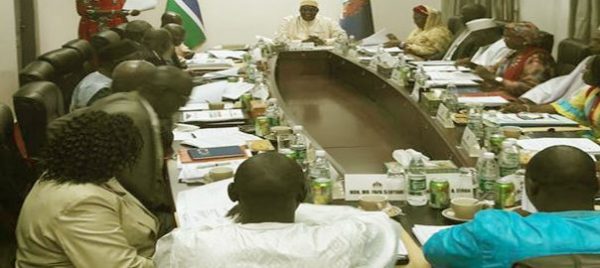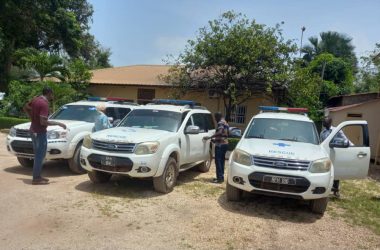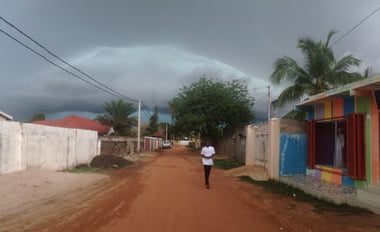 (JollofNews) – President Adama Barrow of the Gambia has used his first cabinet meeting to set out his key development priorities for the country.
(JollofNews) – President Adama Barrow of the Gambia has used his first cabinet meeting to set out his key development priorities for the country.
The president who succeeded former long-term ruler, Yahya Jammeh in January, said expectations are high on his regime and it will urgently embark on a transformative national development agenda in line with its election manifesto.
He said his government will as a matter of urgency take steps to improve the country’s energy sector, fix the broken economy, unify the nation, improve the health and agricultural sub-sectors and end the country’s isolation.
Mr Barrow further highlighted the urgency for institutional, electoral and constitutional reforms in line with what he described as “our new democratic principles that will respond to the realities of our time.”
He added that all these will be addressed alongside with the civil service and security as well as state-owned enterprise reforms.
The president urged his cabinet ministers to be resolute in their determination to build a better Gambia.
He said with the wealth of experience and competence in the cabinet, rapid transformation can take place to bring back the former glory of the nation.
He expressed optimism that the cabinet will work together to formulate the right policies and programmes to address short-term needs but also to control poverty, hunger and disease, which he described as “the enemies of humankind.”
In line with democratic principles, President Barrow advised his cabinet to debate constructively to reach consensus on the common agenda. This, he said, will require collective responsibility to further the national development agenda. He called on the cabinet to work hard and take advantage of the good will of our development partners to achieve the expectations of Gambians.
while thanking the ministers for taking the responsibility of nation building, the president urged them to work together and advised that to success they must all “strive and work and pray” as stated in the Gambia’s national anthem.






A second footprint in the sand pointing Gambia in the right direction/
I hope so. How I hope that the foot prints in the sand are pointing in the right direction of good Leadership and good Governance, not Ethnic Group Based Party Politics and Mob Rule of Vigilantism and Selective Arrrests and Detentions. At the moment, however, the foot prints I am Seeing and being shown are, Not of the first. I am more Convinced of later due to Reports from the Gambia. I hope I would be proven wrong.
I think we need to be optimistic and see the violence as isolated, spontaneous events of overzealous supporters, of one group or the other, who are unable to savour their victories in humility and, hence, celebrate moderately or accept defeat gracefully, rather than a deliberate state policy.
The Coalition Government is doing the right thing to engage with the affected communities more, using both the “carrot and stick” approach and we must guard against attempts by some people in the media, especially, to overblow this conflict into what it isn’t.
I know the media’s intentions are well meaning, but the actions and utterances are misguided and misinformed, and has the potential to distort the crisis and further aggravate it.
That’s why I think these media houses should not be ignored by the authorities. They should be engaged to disabuse the minds of their listeners, however insignificant we may think they are, and to put the crisis into their proper perspective.
Mike, I like his priorities. Energy is crucial to get us out of darkness and grow our economy. Agriculture and food security, Health care and institutional stability as cornerstone of our collective responsibility towards self reliance as a developing country. The question I always have and my fear is implementation and how he will get his subordinates to be on the same page. The president need to stop being a nice guy and start acting like a CEO with specific goal and send a clear message to all stakeholders.” I am not afraid to kick your a….
God Bless The Gambia
My Good Doctor;
I will remind you of my” Torchlight” page which said;
I hope this next raft of Loans and Grants will be used to create something; Gambia can not borrow forever;
All I have heard so far is the farmers may get some seeds and fertiliser; The turn around on this is 6 to 12 months;
The IMF are poking the Gambian chest again;
I would suggest borrowed money sitting in a bank and attracting daily/ monthly interest, is a considerable burden for the Gambian people to bare, considering the debts created by massive embezzlement and food shortages, lack of cash flow>>>dragged by 8% inflation. All that borrowed money will only increase inflation more and further exacerbate the misery for Gambians even more. One also wonders what effect borrowed money will do the the Dalasis?
It’s taken 3 months for this government to make the “wish list” statement it has today. The government needs to cut down its size at least for the next two years to make extra cash available for business/youth regeneration and to attract Gambians back home;
The Government have already borrowed 25 million from the islamic bank. I think the economy is in grave danger of heating up.
Where is the brains and the ambition to be found ?
The engine for growth of any economy is its (most) available resources, and the catalyst for that economic growrh is how these are prudently harnessed to maximise production of goods and services to meet the needs of the population first, before the surplus is sold abroad.
Matter of fact, no country lacks the resources to achieve real economic growth that has a corresponding impact on the lives of its people, no matter how miniscule, but what we lack in much of the socalled developing world, is the organisational skills and the knowhow (not knowledge), to achieve the most, from what we have. What we do instead, and actually do it very well, is to mortgage our natural resources to foreign corporations for peanuts, mismanage or steal the little that we receive from these mortgages and alienate a vast majority of our human resources from productive economic activities, either through corrupt politics, poor organisation, internal civil strives or brutal and often, senseless armed conflicts.
In Africa, for example, there is no shortage of very well educated people at all levels of managerial positions in governments and NGOs throughout the continent, yet except for one or two, the story of abject poverty and unbearable misery for the masses, is the same everywhere, regardless of differences in levels and variety of available resources.
Cont…
The reasons, in my view, can be traced to our common history as colonies. The Colonialists may have been motivated by a genuine desire to “civilize” the natives, but what was also a factor of the “division” or “scramble” for Africa, was the advent of the industrial revolution, necessitating the need to secure sources of raw materials, cheap (actually free) labour and markets for the finished goods.
At the core of the economic model for the colonies, were the THREE main factors of sources for: (1) Raw Materials, (2) Cheap Labour and (3) Markets, and though the dynamics of our relationships with the former colonial masters has changed, and our economies have become much more complicated, we still continue to play the same roles, when we examine our economies at the simplified levels.
The Gambia, for example, still produces groundnuts and imports everything else. Groundnuts unfortunately, are no longer the valued produce they used to be and farmers struggle to market their produce every year, because the demand is no longer there. When I walk into my local supermarkets here in Birmingham, groundnut oil is the least in stock in the cooking oil sections.
Short term, President Barrow may need to rely on borrowing, grants or foreign aid to achieve his development goals, but long term, The Gambia needs to develop a sustainable development strategy that prudently harnesses our resources, to reverse this decades or centuries old economic model of cheap sources of raw materials and markets for overseas goods.
Its good to promise to tackle all the problems that the nation faces, particularly infrastructure, energy, health, education and jobs, but its a completely different thing to find the funds to fulfil these promises. The trick is to be frank with the people otherwise, he will be a disappointment to many people soon.
As The Gambian government embarks on nation building, education of the youths should an important component of any development structure. The university of The Gambia should be strengthened in order to improve the quality of education the students receive at end of the academic period. Both academic and technical trainings should be given priorities by the new government. Education is a good source of improved lives and better governance. Therefore no meaningful development can be achieved in The Gambia without heavy investment in the educational structure.
Mr Jarjou; I am in total agreement; But I would suggest the government needs to plant these seeds with sound long term policies.
The focus right now is for short term economic policies to create new business/ reinforce loss making institutions towards profitability/ and create profit from labour/ Inward investment/
Throughout history it is the youth who stimulate change and economic viability/ The Youth drain must be reversed/ small business/ small manufacturing/ and technical workshops to acquire skills/ commerce/ and growth/
This is not “rocket science” What I am saying is proven by the results from many nations. WE have the knowledge/ lets use it/ God Bless.
Bax I agree wholeheartedly with most of your appraisal/ But you appear downhearted on the state of agriculture.
I don’t agree that Groundnuts are out of fashion. There is significant demand in Europe/Asia/ and The Middle East/ South America/ Selling the produce is not an issue/
It is the stupid Jammeh doctrine that robbed land and resources from the Farmers and the middle men who squeezed the profit margin for there profit. These issued can be easily reversed.
Land Ownership and making farming profitable again adding new thinking and commercial viability will set out a simple plan to regenerate reinvigorate and return profitability back in the hands of the farming community/ In the shortest time. From small acorns do Great Oak Trees Grow.
A completely different mindset can also reap great profits and employment plus tax streams from Tourism.WE need to see encouragement to Gambian’s abroad setting up sales and marketing towards increasing the numbers and a strategy to make Gambia tourism friendly all year round.
At present The Gambia enters its Winter season where those employed in Tourism have to seek other jobs/ whilst government hibernates until September. This can be changed.
Change is the key word/